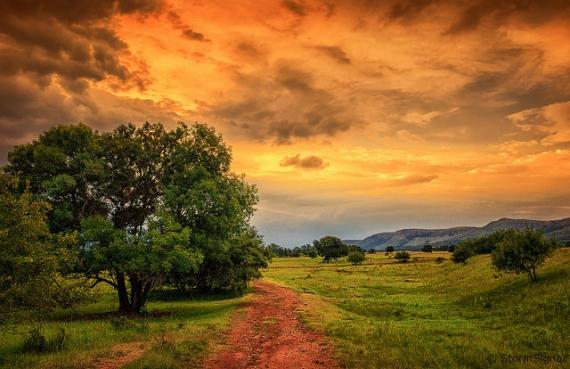Benefits and Drawbacks Associated with Undeveloped Land Investments
Posted: March 11, 2015 by LandCentury

Thinking of investing in undeveloped land? There are many benefits to this type of land investment, but there are some drawbacks that need to be considered too. From costs to upkeep, value and purpose, theres a lot to like and loathe about underdeveloped land.
Undeveloped, or raw, land has no utilities, no structure or pre-defined building site and no intra-parcel roads. In a nutshell, it lacks all the components of an urban development.
Some people also include farmland, ranges and forest in the raw land category. Others claim that only natural areas and wildness preserves count as undeveloped.
- Farmland is land that is not developed for urban use. In most cases, this type of land is not connected to municipal sewer and water systems. However, structures, wells and septic tanks may be present. Some people consider farmland undeveloped, while others do not.
- Forest and range land is held by the government and does not offer urban services or buildings, such as utility connections, structures or roads. This land is conserved through government agencies.
- Under stricter definitions, wilderness and preserve areas are the only type of undeveloped land. The ecological and recreational value of the land is preserved, but its natural resources are typically left untouched.
No matter your definition of raw land, this type of investment offers numerous advantages, including:
In most cases, raw land is significantly less expensive than developed land. The moment a home is built on a parcel of land, the value of the property increases substantially. Because underdeveloped land lacks the utilities, structures and in most cases, road access, youll pay far less than you would for a parcel of land thats already been developed. Oftentimes, you can purchase multiple acres at rock bottom prices.
With raw land, you have the freedom and flexibility to do just about anything you want with it providing its within local zoning regulations. You can:
- Leave your property as-is
- Develop it by building a home, or multiple homes if you have enough land
- Run utilities, or live off-the-grid
- Turn that piece of raw land into a working farm that produces income
- Lease the land to cattle ranchers
- Youre only limited by your imagination and zoning regulations.
If you plan on purchasing undeveloped land and using it for agricultural purposes, your taxes will be reduced.
Envision a home where your nearest neighbor is miles away? When you purchase raw land, you can make this dream a reality.
If you arent investing in land for personal purposes, the land can be subdivided to increase value and the possibility of making a quick profit. Just keep in mind that this may only be beneficial (or possible) if youre purchasing several acres of land.
Land is a tangible asset that your children and your grandchildren can inherit. While this may not benefit you personally, a valuable piece of land may provide the means to care for your family after youre gone.
There are plenty of benefits to investing in raw land, but there are some drawbacks that need to be considered too.
Lenders are hesitant to grant loans to people investing in raw land. Why? Because typically, its not a profitable venture for them.
That being said, there are some lenders that will grant a loan for undeveloped land. But its important to keep in mind that the rates will likely be higher and in most cases, these loans come with shorter terms.
Vacant, raw land has great potential. You can turn it into just about anything you want. Notice the emphasis on just about? Depending on where you buy the land, you might have to go through quite a bit of red tape just to develop your property. This tends to be an issue mainly with properties that are close to cities. You may have to deal with regulations of Homeowners Associations, who might have a say in how large your home can be, where you can build the home and how it looks. However, if you purchase land outside of the city, youre far less likely to have such restrictions.
Developing land can be expensive. Unless you plans on leaving the land as-is, youll need to prepare for these costs. There are several things youll need to do to ensure your land is ready for building, such as:
- Testing the land to ensure it has enough water and is capable supporting a septic system and home (or structure).
- Clearing the site to prepare for building and the creation of roads.
- Running utilities.
- Building roads to ensure workers can access your property.
A lot of time, effort and money goes into preparing land for development, so keep this in mind if youre considering this type of investment.
Some people view raw land as a money sink. Unless you find some way to generate income with your property, youll likely wind up spending money on maintenance and property taxes out of your own pocket.
From an investment standpoint, undeveloped land takes a long time to generate a return. Unless you have the capital to build on the property, it may be quite some time before your property offers you a decent return.
Undeveloped land can be a great investment, but its not the right choice for everyone. Generally, there are more advantages than disadvantages to purchasing raw land. The biggest concern will be negative cash flow. If youre not developing the land or finding a way to generate income with it, youll spend money to maintain it, but will not see a quick return. Before diving into this type of investment, sit down and weigh the pros and cons, and create a plan for your property.
What is Undeveloped Land?
Undeveloped, or raw, land has no utilities, no structure or pre-defined building site and no intra-parcel roads. In a nutshell, it lacks all the components of an urban development.
Some people also include farmland, ranges and forest in the raw land category. Others claim that only natural areas and wildness preserves count as undeveloped.
- Farmland is land that is not developed for urban use. In most cases, this type of land is not connected to municipal sewer and water systems. However, structures, wells and septic tanks may be present. Some people consider farmland undeveloped, while others do not.
- Forest and range land is held by the government and does not offer urban services or buildings, such as utility connections, structures or roads. This land is conserved through government agencies.
- Under stricter definitions, wilderness and preserve areas are the only type of undeveloped land. The ecological and recreational value of the land is preserved, but its natural resources are typically left untouched.
The Benefits of Underdeveloped Land
No matter your definition of raw land, this type of investment offers numerous advantages, including:
Low Cost
In most cases, raw land is significantly less expensive than developed land. The moment a home is built on a parcel of land, the value of the property increases substantially. Because underdeveloped land lacks the utilities, structures and in most cases, road access, youll pay far less than you would for a parcel of land thats already been developed. Oftentimes, you can purchase multiple acres at rock bottom prices.
Flexibility
With raw land, you have the freedom and flexibility to do just about anything you want with it providing its within local zoning regulations. You can:
- Leave your property as-is
- Develop it by building a home, or multiple homes if you have enough land
- Run utilities, or live off-the-grid
- Turn that piece of raw land into a working farm that produces income
- Lease the land to cattle ranchers
- Youre only limited by your imagination and zoning regulations.
The Possibility of Reduced Taxes
If you plan on purchasing undeveloped land and using it for agricultural purposes, your taxes will be reduced.
Plenty of Open Space
Envision a home where your nearest neighbor is miles away? When you purchase raw land, you can make this dream a reality.
Potential for Quick Profit
If you arent investing in land for personal purposes, the land can be subdivided to increase value and the possibility of making a quick profit. Just keep in mind that this may only be beneficial (or possible) if youre purchasing several acres of land.
Tangible Asset That Can Be Passed Down to Children
Land is a tangible asset that your children and your grandchildren can inherit. While this may not benefit you personally, a valuable piece of land may provide the means to care for your family after youre gone.
The Drawbacks of Undeveloped Land
There are plenty of benefits to investing in raw land, but there are some drawbacks that need to be considered too.
Underdeveloped Land Loans Are Hard to Come By
Lenders are hesitant to grant loans to people investing in raw land. Why? Because typically, its not a profitable venture for them.
That being said, there are some lenders that will grant a loan for undeveloped land. But its important to keep in mind that the rates will likely be higher and in most cases, these loans come with shorter terms.
Local Regulations
Vacant, raw land has great potential. You can turn it into just about anything you want. Notice the emphasis on just about? Depending on where you buy the land, you might have to go through quite a bit of red tape just to develop your property. This tends to be an issue mainly with properties that are close to cities. You may have to deal with regulations of Homeowners Associations, who might have a say in how large your home can be, where you can build the home and how it looks. However, if you purchase land outside of the city, youre far less likely to have such restrictions.
High Preparation Costs
Developing land can be expensive. Unless you plans on leaving the land as-is, youll need to prepare for these costs. There are several things youll need to do to ensure your land is ready for building, such as:
- Testing the land to ensure it has enough water and is capable supporting a septic system and home (or structure).
- Clearing the site to prepare for building and the creation of roads.
- Running utilities.
- Building roads to ensure workers can access your property.
A lot of time, effort and money goes into preparing land for development, so keep this in mind if youre considering this type of investment.
Negative Cash Flow
Some people view raw land as a money sink. Unless you find some way to generate income with your property, youll likely wind up spending money on maintenance and property taxes out of your own pocket.
A Long-Term Investment
From an investment standpoint, undeveloped land takes a long time to generate a return. Unless you have the capital to build on the property, it may be quite some time before your property offers you a decent return.
Undeveloped land can be a great investment, but its not the right choice for everyone. Generally, there are more advantages than disadvantages to purchasing raw land. The biggest concern will be negative cash flow. If youre not developing the land or finding a way to generate income with it, youll spend money to maintain it, but will not see a quick return. Before diving into this type of investment, sit down and weigh the pros and cons, and create a plan for your property.




